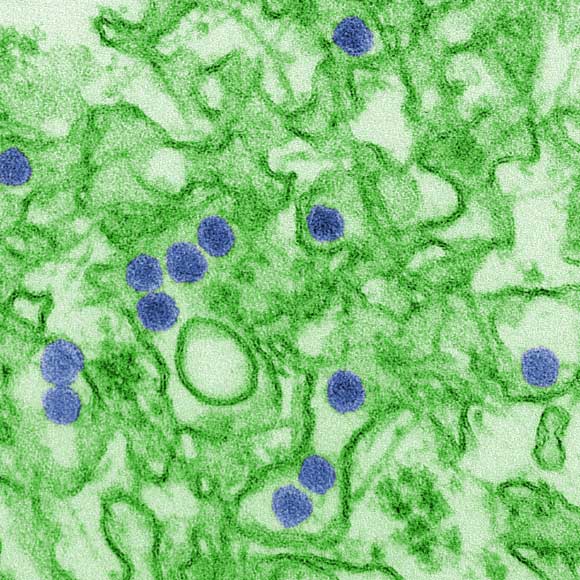An antibody that protects against dengue virus is also effective against Zika in mice, according to a new study published in the journal Nature Immunology.

This is a digitally-colorized transmission electron microscopic (TEM) image of Zika virus. Virus particles, here colored blue, are 40 nm in diameter, with an outer envelope, and an inner dense core. Image credit: Cynthia Goldsmith, CDC.
“Antibodies remain in the bloodstream for weeks, so one or a few doses of an antibody-based drug given over the course of a woman’s pregnancy potentially could protect her fetus from Zika, with the added benefit of protecting her from both Zika and dengue disease,” said senior author Professor Michael S. Diamond, from the Washington University School of Medicine.
“Dengue causes high fever, severe headaches, and joint and muscle pain in children and adults but does not directly harm fetuses.”
“We found that an antibody called EDE1-B10 not only neutralizes the dengue virus but, in mice, protects both adults and fetuses from Zika disease.”
Since dengue and Zika are related viruses, Professor Diamond and co-authors reasoned that an antibody that prevents dengue disease may do the same for Zika.
They infected nonpregnant adult mice with Zika virus and then administered the EDE1-B10 antibody one, three or five days after infection. For comparison, another group of mice was infected with Zika virus and then given a placebo.
Within three weeks of infection, more than 80% of the untreated mice had died, whereas all of the mice that received EDE1-B10 within three days of infection were still alive, and 40% of those that received the antibody five days after infection survived.
To find out whether the antibody also could protect fetuses from infection, the team infected female mice on the sixth day of their pregnancies with Zika virus and then administered a dose of antibody or a placebo one or three days later.
On the 13th day of gestation, the amount of Zika’s genetic material was 600,000 times lower in the placentas and 4,900 times lower in the fetal heads from the pregnant mice that were treated one day after infection, compared with mice that received the placebo.
However, administering the antibody three days after infection was less effective: it reduced the amount of viral genetic material in the fetal heads 19-fold and in the placentas 23-fold.
These findings suggest that for the antibody to effectively protect fetuses from Zika infection, it must be administered soon after infection.
“Such a goal may be unrealistic clinically because women rarely know when they get infected,” the scientists noted.
“However, giving women the antibody as soon as they know they are pregnant could provide them with a ready-made defense against the virus should they encounter it.”
_____
Estefania Fernandez et al. Human antibodies to the dengue virus E-dimer epitope have therapeutic activity against Zika virus infection. Nature Immunology, published online September 25, 2017; doi: 10.1038/ni.3849







